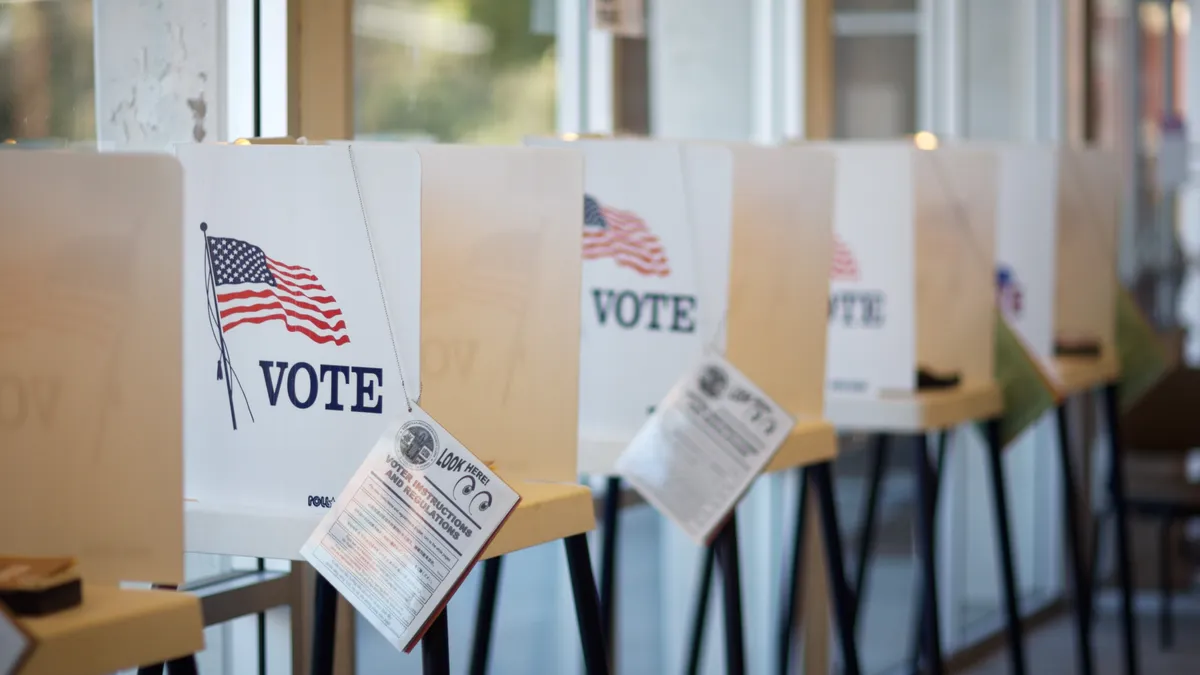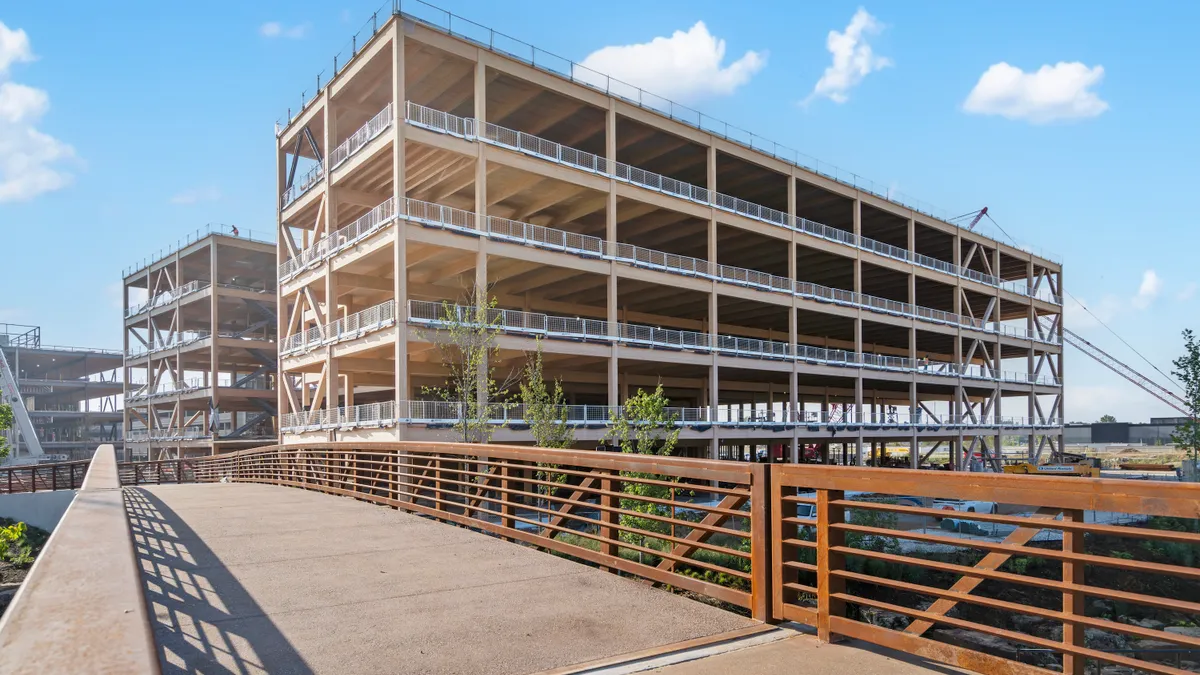While many of the country's voters are focused on issues like healthcare and job creation during this year's midterm elections, some candidates in the more than 500 House, Senate and gubernatorial races could significantly and directly impact the construction industry if they are elected.
In addition to the platforms one might expect — Republicans advocating for deregulation and Democrats for a more active government role in the economy, for example — a number of candidates have stances on infrastructure funding, immigration and mega-projects in their districts. Below are the biggest issues this election season involving the construction industry.
Gas tax
The amount of federal tax on each gallon of gasoline (18.4 cents) and diesel fuel (24.4 cents) hasn't budged since 1993, and this is one reason the Highway Trust Fund, which helps pay for roads, bridges and other surface transportation projects around the country, is almost empty, according to the Congressional Budget Office. Needless to say, this issue is important to the construction industry as these projects are many civil contractors' bread and butter.
The strategy of raising the federal gas tax to help fund infrastructure projects might have no bigger fan than incumbent Rep. Peter DeFazio (D-Ore.), who is defending his seat against Republican Art Robinson. In March 2017, DeFazio proposed a one-cent-per-year increase in the gas tax and has had some bipartisan support from fellow congressmen including outgoing House Transportation and Infrastructure Committee Chairman Rep. Bill Shuster (R-Pa.).
DeFazio's one-cent proposal, which supposedly would raise about $500 billion for infrastructure projects over 30 years, is very modest compared with the 25-cent increase that the U.S. Chamber of Commerce proposed. President Donald Trump's administration has also floated the idea of a similar increase.
Still, many lawmakers have said they don't want to throw another tax on the working class, a concern DeFazio has dismissed on a few occasions.
“If you don’t increase taxes, we’re not going to have an infrastructure bill, and we’re doing nothing, and we’re just sitting here jawing,” DeFazio said at a news conference, according to The Washington Post. Calling his colleagues who feared losing re-election if they supported such a tax "gutless wonders," DeFazio said no one had lost an election in a state that passed a gas tax increase. In fact, polling has shown that taxpayers don't mind gas tax increases as long as the money is dedicated to infrastructure.
Rep. John Delaney (D-Md.) raised eyebrows this year when he suggested, after President Trump reduced the corporate tax rate from 35% to 21%, that Congress increase the tax again to 23% and use the extra $200 billion to help pay for infrastructure. Delaney is not seeking re-election and has announced he will run for president in 2020.
Immigration, border wall construction
Immigration issues and the construction of a U.S.-Mexico border wall go hand in hand and have the potential to impact the construction industry in several significant ways. First, despite pushback by public agencies that have either blackballed or given extra scrutiny to border wall contractors and bidders, the potentially $22 billion construction project could create tens of thousands of jobs.
But perhaps a bigger issue is the signal it sends to the immigrant workers, undocumented and documented, whom the construction industry needs. A stricter policy of deportation and refusal of entry to those crossing the Mexican border could put an even bigger dent in the U.S. construction labor pool.
In border states like Arizona, candidates hold strongly opposing views on how the country should handle cross-border traffic and immigration. Democratic gubernatorial candidate David Garcia is part of the anti-border wall faction and, in August, reportedly asked a group gathered at a conference in New Orleans to imagine a border-free Arizona, which critics pointed to as a call for an open border with Mexico. Garcia's official position is that he will "vigorously oppose Trump’s foolish wall and the further damage it would inflict on our border communities and economic partnerships."
Garcia is running against Republican governor, Doug Ducey, who holds an opposing position. Ducey created the Arizona Border Strike Force — a collaboration between local, state and federal law enforcement that patrols the state's stretch of the U.S.-Mexico border and claims more than 2,000 arrests. But he has been lukewarm on Trump's wall.
Meanwhile, construction industry groups like the Associated General Contractors of America have called on lawmakers to develop a temporary guest worker program that would allow U.S. firms to tap those with trade skill and expertise from abroad without fear of violating immigration laws.
Environment versus growth
Environmentalists have held up construction projects all over the country, from the Chase Center in San Francisco to pipeline projects in the Mid-Atlantic region. In Florida, development and the construction that accompanies it is one of the state's economic engines, but Democratic Andrew Gillum could change that dynamic if he wins the governor's race over Republican Ron DeSantis this November.
Earlier this month, Gillum told a crowd gathered in Riviera Beach that the state's water, air and oceans "have been compromised under Republican control" and that he would spearhead a transfer to clean energy and promote septic-to-sewer programs, both of which could pay off in construction jobs.
DeSantis holds the standard pro-business positions of many Republicans — fewer taxes and less regulation — but also advocates for many of the same conservation goals as Gillum. Unlike DeSantis, though, Gillum favors stricter regulations, especially around what he termed "out-of-control growth patterns" in Central Florida and northward, not likely something that developers will want to hear.
California bullet train, San Joaquin Delta projects
No matter which candidate for California governor wins next month — Democrat Gavin Newsom or Republican John Cox — the beleaguered $77 billion bullet train that will connect Northern California to Southern California and the $20 billion twin tunnel San Joaquin Delta project are going to take a hit. This might be good news for California taxpayers but not much for the construction industry to cheer about.
Cox said he would do his best to scuttle both projects, while Newsom is in favor of scaling back both. Newsom said he would support the completion of the rail's Northern California segment but hold off on additional planning and construction until the project is on more stable financial ground. He also said he would try to reduce the Delta project to one tunnel.
Proposition 6, legislation that would repeal a new gas tax meant to partially fund the rail, is on the ballot next month. Further, opponents of the high-speed rail project have already put a measure on the 2020 ballot that would direct the governor to stop construction and direct the funds to other transportation projects.



















